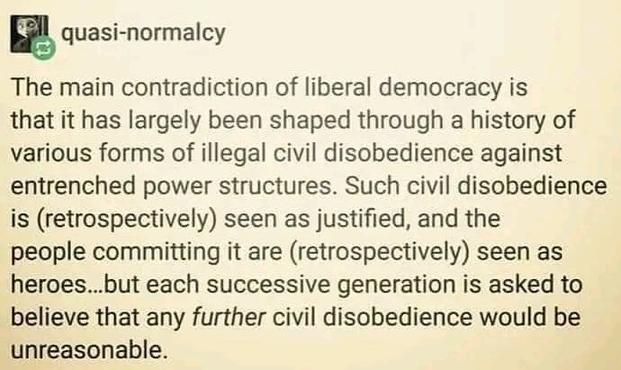@firefoxx66 Closely correlated is the belief that Democracy is done evolving.
Clearly a system where everyone have to delegate their part of the power to a different person, possibly with very few such delegates that one can realistically choose from, under the threat that if your choice isn't popular enough your vote will simply be ignored, and where those delegates are free to just ignore everything they promised in order to get your vote in the first place, is the best one can imagine!
@davevolek has some interesting ideas on how to build a bottom-up democratic government (Tiered Democratic Governance). I think it's a pretty solid idea.
There's also a lot of work that has been put into alternative methods of voting similar to what you mention, ranging from ranked-choice voting all the way back to sortition (as practiced in ancient Athens).
Defining requirements is more about the end goals than the engineering techniques used to meet them. What do we want our system to accomplish? Currently, we have a system that produces a tyranny of the majority. There are ways to make democracy even more inclusive. The term I use for these, collectively, is proportional representation. This is when the system grants power to the constituents in proportion to their numbers, rather than having a strict cutoff when plurality or majority is reached.
@hosford42 @NohatCoder @firefoxx66
Most European countries have PR elections and legislatures. But they still have their issues related to the 12 limitations.
The TDG is not another version of western democracy. It has no political parties.
When Europe moved from fuedalism to democracy, this was a big jump for the better. When a nation moves from western democracy to the TDG, it will be just as big of a jump.
@NohatCoder @hosford42 @firefoxx66
"Soviet democracy" is a misnomer. The soviet elections were rigged to support the Politburo.
TDG elections will be more organic.
@davevolek It would be way more convincing to explain what sets it apart, specifically, and not just say it will be different.
@hosford42 @NohatCoder @firefoxx66
Communists had one party. The TDG has no parties.
Communists had an ideology. The TDG has open minds.
Communists engaged in power struggles. The TDG elections have people move in, out, up, down, and around.
Maybe 5% of the citizens were allowed to vote in the communist election. Everyone can vote in TDG elections.
@NohatCoder @davevolek @firefoxx66
"In post-revolutionary Russia local workers' soviets would elect representatives that go on to form regional soviets, which in turn elect representatives that form higher soviets, and so on up to the Congress of Soviets."
@hosford42 @NohatCoder @firefoxx66
Everyone gets to vote in the TDG.
But instead of voting on charisma, issues, or self interest, the TDG teaches voters to look more at "good character" and "capacity for governance."
It will take some time to build that culture. Maybe five years.
@davevolek What are your thoughts on the stability question? If the system is, in actuality, more prone to power accumulation at the higher levels, how can this be countered? Fewer tiers? Some other mechanism?
What are your thoughts on a tiered direct democracy? I.e. a location-based hierarchical organization still exists, but people have direct involvement at every level rather than electing representatives. So, for example, all people in a city would vote directly on city questions, and likewise for state and nation, preserving the locality of governance.
@hosford42 @NohatCoder @firefoxx66
The TDG must cast aside power accumulation if it is to work. But this is easier said than done. So the TDG needs to be built outside the current system that is full of power accumulators.
The power accumulators will not be insterested in the early TDG. So the TDG can build the good culture without the bad culture in the picture.
When the TDG becomes better known, anyone with power accumulation tendencies will not be voted for.
@hosford42 @NohatCoder @firefoxx66
Sorry, I just noticed your two questions.
I'm not sure what the "stability question" is about. So, I shall refrain from commenting.
About 30 years, I did some study with direct democracy--and concluded it would not be a good way for future governance. Sorry, most of us won't spend the time to analyze all the issues to cast a wise collective vote, like whether our sanitation department is running well or not.
@hosford42 @NohatCoder @firefoxx66
The theory was well thought out. But when power accumulation instincts kick in, that theory no longer works.
@hosford42 @NohatCoder @firefoxx66
"Participation and vigilance" are buzzwords designed to cast blame on those who do not participate or watch. For example, do you watch your local sanitation department to ensure it is operating honestly and efficiently?
In a well functioning western democracy, there are checks in place where only a few people need watch closely. While this seem to be eroding, the TDG will be better able to set up systems of vigilance.
@hosford42 @NohatCoder @firefoxx66
Let me elaborate.
Is your local sanitation system (sewers and garbage pickup) running well?
Are contracts awarded fairly? Or is there graft?
Are employees treated well and fairly? Are they paid a decent wage?
Is the department looking for efficiencies, like seeing what other districts are doing. Or is the department a bastion of middle managers earning big salaries and inflexible to try new ways.
Are you vigilant in these matters?
@hosford42 @NohatCoder @firefoxx66
The political parties are not going to allow you in their back rooms-----unless you have somehow climbed high in the party hierarchy.
So we will never know why they do the things they do. What they say in public is not what they said in private. There may be good reasons for this discrepancy, but often there are sinister reasons.
The trust is not there.
1/2
@hosford42 @NohatCoder @firefoxx66
So there's a Catch 22. We on the outside could be more vigilant, but likely we will not find the truth behind the decision.
The top tier of the TDG will be a lot more trustworthy. We might not like some its decisions, but we believe the issue was discussed from different angles and no corruption was involved. The top tier had a difficult decision to make--and made it. They did their best. Let's move on.
Trust. That's the key
2/2
@hosford42 @NohatCoder @firefoxx66
Neither you nor I are in a position to be effectively vigilant on big or small societal matters. We are too far away from the decision process.
In "Glimpse of a Future Democracy," I envision a city of 100,000 people having 600 people in elected governance. That's a lot of people to watch over things. The other 99% of us can spend some time volunteering in our community--instead of watching.
https://tiereddemocraticgovernance.org/blog_details.php?blog_cat_id=30&id=512
@NohatCoder @hosford42 @firefoxx66
In the future TDG, many people will be content to leave governance to someone else. But their vote is still quite important to find those people with a flair for TDG governance.
And if those people with TDG flair get too full of themselves, the TDG elections will cast them aside. The TDG needs to learn how to cast our power-accumulation instinct aside.

